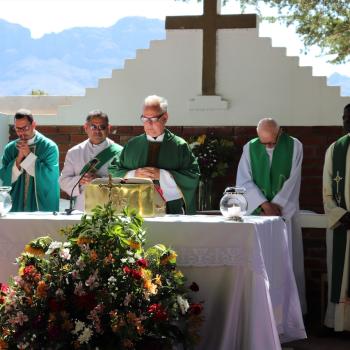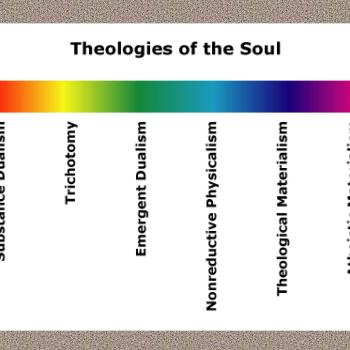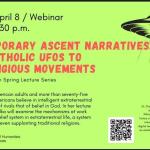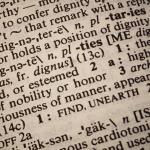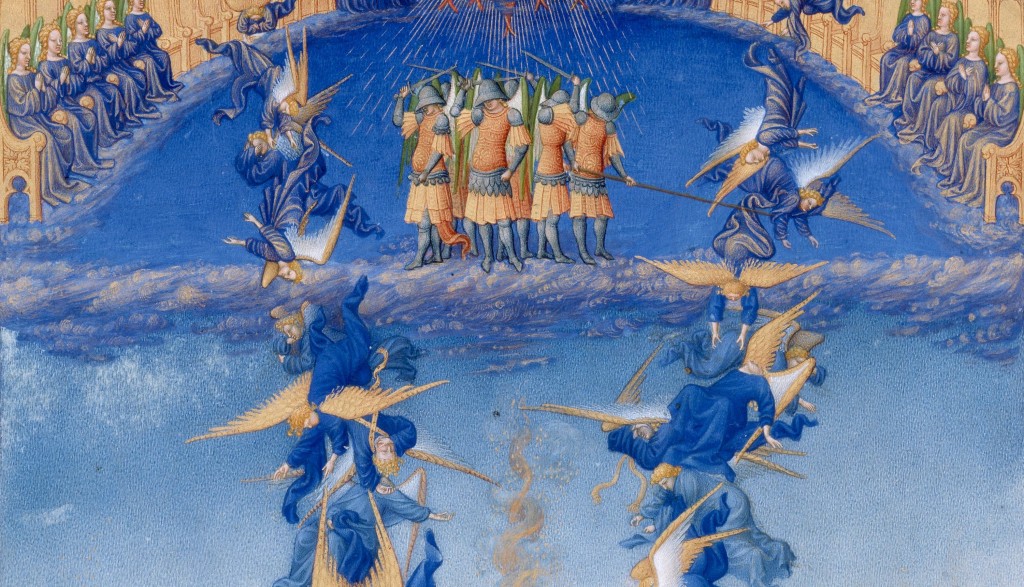
That between heaven and earth there is no great chaos and no great silence or a sort of generous neutrality, but rather, that lively relationship between Creator and creature going back and forth . . . –Alfred Delp, SJ
I want to make amends to the Jesuits for a Star Wars piece comparing them to the First Order with the following post by a Jesuit on a great Jesuit martyr of WW2.
In all seriousness, take some time with the following guest post if you have not had the opportunity to take an Advent retreat:
We live in a time when fears and talk of fears pervade. The danger, however, is allowing those fears to prevent us from doing the right thing. For Christians, doing the right thing entails “christifying” one’s life. We must ask ourselves, “Am I living with Christ, through Christ, and in Christ?” Perhaps, the answer can be found in devotion to the Heart of Jesus?
In an Advent homily during WW2 in 1942, Alfred Delp, SJ, addressed his parishioners by acknowledging their fears and worries. He comforted the people of St. Georg’s Parish in Munich by telling them that Advent speaks of a God who seeks humankind so that “people’s hearts and God’s heart beat together in one rhythm, so that we may be representatives and intercessors for a troubled, beaten, and spiritually helpless mankind.” (Delp, Advent of the Heart).
For Delp, the season of Advent prepares us to receive the “the form of our existence” the Heart of Jesus. In devotion to the Heart of Jesus, Delp preaches a God who shows us the goal of our existence:
Cor Jesu stands before humankind with the wounds He bears in the center of His Heart. A deeply essential feature of our life is visible here. Even from the natural perspective, the idea of sacrifice belongs to the pattern of life, and it belongs even more to the pattern of the Christian [life]. (Delp, Advent of the Heart)
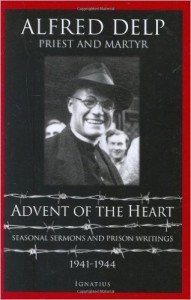
In this Catholic devotion, God shows us that true power is found in humility and poverty, and He invites a response from us that corresponds with His own self-giving. A human being “does not come out beyond himself into such intimacy with God, letting the divine merciful reality flow in,” then he becomes “less than himself” (Delp, Advent of the Heart). To be fully human entails giving oneself over to Christ, so that His Heart can make us free through the power of His love. We are actualized by God. The Heart of Jesus calls forth Delp and his parishioners to recognize who they truly are and are meant to be. The Heart of Jesus bestows upon us true freedom by opening up a stage upon which we can become “other Christs” in the world.
Whoever is not capable of standing before one’s community, one’s brothers [and sisters], and somehow taking their deepest needs upon yourself—coming before the Lord God and taking on the guilt, taking on the punishment—without this capability, then one still lacks a great deal before one can call oneself a Christian. (Delp, Advent of the Heart)
The Divine-human heart communicates a God who steps into the chaos of the human condition. This wounded Heart presents the drama of the Divine life to human existence for the sake of guiding humankind from within to God’s consecrated destiny.
The surrender of self to Christ does not just heal our brokenness, but re-creates us out of that brokenness and raises up to a greater status in God. The redeemed believer is incorporated into the Body of Christ and, consequently, is formed in Christ’s praxis or is “christified.” Our corresponding response to Christ’s reconciliation in our lives is to take up the guilt and alienation of our brothers and sisters.
Delp, however, does not preach that people attempt and achieve impressive deeds: the commitment to one’s brothers and sisters in need does not require great works but rather a greatness of hearts. Delp preaches:
God does not need great pathos or great works. He needs greatness of hearts. He cannot calculate with zeroes” (Delp, Advent of the Heart)
Yet where does Delp locate that fitting human person who permitted him or herself to be “christified” in the devotion to the Heart of Jesus? One can find that human model in his 2nd prison meditation written in late November 1944. As a political prisoner, Delp wrote a series of prison meditations from mid-November 1944 to late January 1945 prior to his execution. His first two meditations were on the Heart of Jesus. In his second meditation on the Heart of Jesus, he is led to reflect on the call of Mary. Reflecting on Mary, Delp sees that our Christian discipleship entails “an openness beyond oneself even if it means deciding or adopting an attitude contrary to one’s own” (My translation from Gesammelte Schriften: Aus Dem Gefängnis)
In the Blessed Mother, God lifts up a genuine human dialogue partner into His story of salvation. Delp reflects that Mary’s yes (or any human creature’s yes) to God is always in an unintended sense, and in an unheard of extent, a yes to herself:
Wherever the Lord God touches a creature, He leads it to its perfection and fulfillment and, at the same time, beyond itself. He does not destroy the addressed “you” but, instead, makes it a more intense and complete “I” than it could ever be on her own. While the other person who intends to assert him or herself goes inward and shuts him or herself off and sits small, tight, and cramped within him or herself and has no idea of the vastness and wonders of God’s creation. (My translation from Gesammelte Schriften: Aus Dem Gefängnis)
For Delp, Mary represents the “christified” life that gathers together all aspects of a creaturely existence into a free expression and abandonment of one’s self unto God, so that the creature is integrated into God’s self-giving love.
In Mary, Delp sees:
That between heaven and earth there is no great chaos and no great silence or a sort of generous neutrality, but rather, that lively relationship between Creator and creature going back and forth: prayer, adoration, and trust. And I [Delp] have been living from it utterly and completely from it utterly and completely over the last weeks. (My translation from Gesammelte Schriften: Aus Dem Gefängnis)
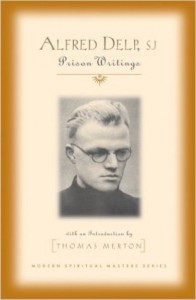
The importance of Mary in Delp’s devotion to Christ and in his understanding of his very own self-sacrifice cannot be underestimated. In his Christmas Eve meditation written on December 25, 1944 from a cold and dank cell, Delp writes,
Motherhood and the grace of compassion have become a law of our life, that the ice of man’s inner solitude can be broken and melted by healing warmth—all this became possible only because the maid Mary yielded of her own free choice to the inner prompting of God’s voice. Her secret is self-surrender and willing acceptance, offering herself to the point of complete obliteration of her personal will. (Delp, Prison Writings)
It is important to recall that obedience to the Divine does not lead to the destruction of our self but to its fulfillment. The radicalness of Delp’s prison meditation tells us that the agency of the Christian, as represented by Mary, lies within God and His eternal dialogue of love. From within us God bears our freedom.
Mary places herself before Christ and before that world. And Mary answers as the Heart of Jesus wants Delp to respond: with complete obedience. “Let it be done”; I am the servant of the Lord”: the perfect submission, the total availability, the total christification of my life.
Thus, in his final letter to his Jesuit brethren, Delp writes,
I must surrender myself completely. This is seed time, not harvest. God sows the seed and some time or other He will do the reaping. The one thing I must do is to make sure the seed falls on fertile ground. I must arm myself against the pain and depression that sometimes almost defeat me… I ask my friends not to mourn, but to pray for me and help me as long as I have need of help. And to be quite clear in their own minds that I was sacrificed, not slain. (Delp, Prison Writings)
Our discipleship involves loving the world in the way God loves a broken world. Giving oneself over to Christ demands a type of obedience that entails a suspension of one’s self-assertion and an entry into the expansiveness of God’s call of love that can pierce ears and hearts made deaf and cold by sin.
Peter Nguyen, SJ is a Jesuit priest and an instructor of theology at Creighton University. He is finishing a PhD in Theology at Regis College, University of Toronto. Theology and jiu-jitsu are his hobbies. His real job involves hearing confessions and rooting for the Chicago Cubs.




